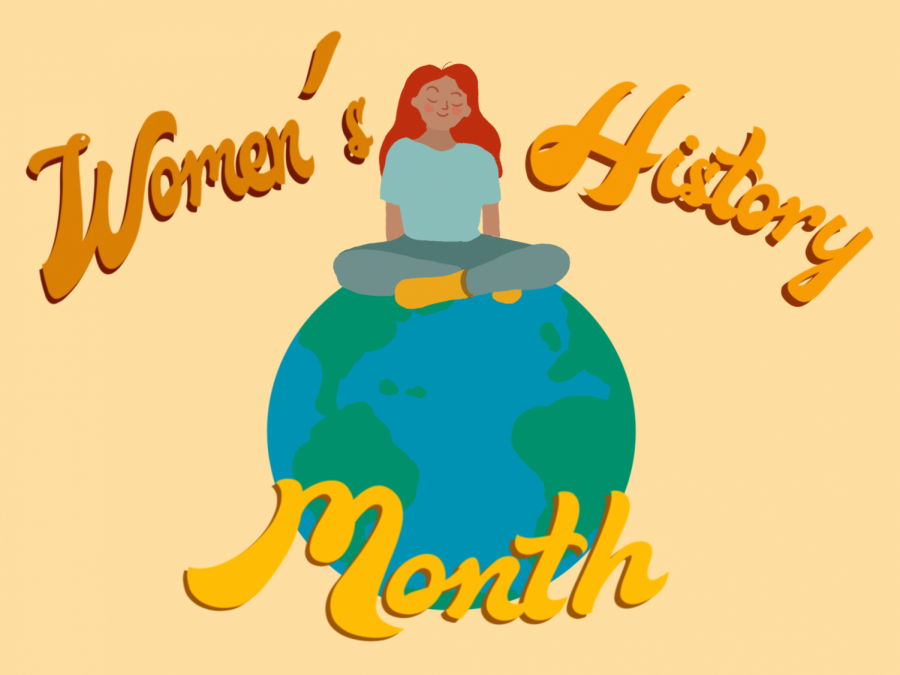The most influential rock artist is none other than Sister Rosetta Tharpe
March 12, 2021
People usually associate the origins of rock ‘n’ roll with Elvis Presley or Chuck Berry and highlight its early years with Jimi Hendrix.
Few know the name or even heard of Sister Rosetta Tharpe, yet she is one of the most influential musicians of the 20th century.
Sister Rosetta Tharpe, known as the “Godmother of Rock ‘n’ Roll” was born Rosetta Nubin in Cotton Plant, Arkansas on March 20, 1915. Tharpe came from a family of “religious singers, cotton pickers and traditional evangelist,” according to Jessica Diaz-Hurtado of NPR.
She picked up the guitar at age four and mastered it by the time she was six, accompanying her mother, Katie Bell Nubin, to church conventions around the South.
Eventually, she and her mother relocated to Chicago in the 1920s and Tharpe began fusing her gospel music with Delta blues and New Orleans jazz. When she was 23, she became part of the Cotton Club Revue, a club in New York City noteworthy in the Prohibition Era.
She signed with Decca Records and received second billing to band leader Cab Calloway.
The release of her first single, “Rock Me,” in 1938 under Decca gave her the breakout she needed. Followed by songs “That’s All” and “The Lonesome Road,” Tharpe became a star with her “stirring gospel vocals accompanied by her exhilarating resonator guitar.”
She was a hit, although the gospel lyrics mixed with secular music stirred some controversy.
Her popularity increased throughout the 1940s as she played with Duke Ellington and the Dixie Hummingbirds.
She fronted Lucky Millinder’s big band during World War II and teamed up with the Jordanaires, an all-white male group. The group would later work with Presley, who was a huge fan of Tharpe.
“That’s what really attracted Elvis: her pickin’. He liked her singing, but he liked that pickin’ first – because it was so different,” Jordanaires member Gordon Stoker recalled.
She persisted with the institutional racism at the times, such as segregated hotels and restaurants. She honed her signature style of “guitar pyrotechnics and powerful soprano,” showing the mastery of her Gibson SG guitar.
Tharpe would go on to collaborate with pianist Sam Price in 1944 and released “Strange Things Happening Every Day,” which became a smash hit, landing second place on the Billboard R&B Chart, the first gospel song to ever cross over.
Later on, Tharpe would work with gospel singer Marie Knight and they would record songs like “Didn’t It Rain” and “Up Above My Head.” Knight became Tharpe’s lover, who had already survived two marriages at that time, and they collaborated and toured together until they split in
1950.
Knight focused on playing piano and singing, while Tharpe played both the guitar and piano and sang.
Tharpe sold out arenas in the 1950s and 25,000 people attended her wedding to Russell Morrison in 1951 at Griffith Stadium in Washington D.C. Her wedding was recorded and released as a topselling record.
Tharpe inspired a slew of rockers who had followed in her path.
Presley was one of them, as well as Berry, who had said his career was “one long Sister Rosetta Tharpe impersonation,” and Little Richard, who named Tharpe “his greatest influence,” according to Stu Hackle of uDiscoverMusic.
As her fame diminished in America in the 1960s, Tharpe joined Muddy Waters and toured Europe, which would inspire a generation of British blues-rockers like Keith Richards, Jeff Beck and Eric Clapton.
Jerry Lee Lewis, Johnny Cash, Bob Dylan, Aretha Franklin and others were also inspired by Tharpe’s musical style.
Sister Rosetta Tharpe was finally inducted into the Rock N Roll Hall of Fame in 2018 by Britanny Howard. Her name may still be on the lips of those who were directly influenced by her or inspired by her, but she’s still not as well-known by the bigger names that succeeded her.
Still, as an artist whose four-decade-long career inspired generations of musicians after her, as an African American woman who shaped and defined a new sound and as a confidant and, allegedly, queer woman who toured with her partner and sold-out arenas, Tharpe’s influence and legacy are unquestionable.









Mark Luccio • Mar 12, 2021 at 12:42 pm
Perfect, I am 64 where was I until I was 45 didn’t how great of an impact she was on my musical life as Jack Kerouc said “the only truth is music” Sister Rosetta is truth.